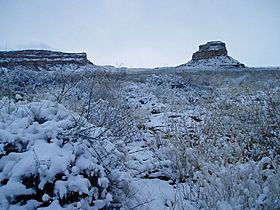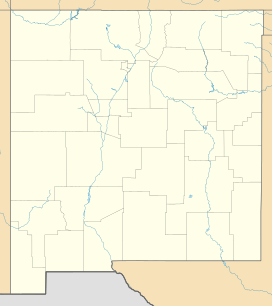Fajada Gap facts for kids
Quick facts for kids Fajada Gap |
|
|---|---|

Fajada Butte and Fajada Gap
|
|
| Location | San Juan County, New Mexico, United States |
| Coordinates | 36°01′08″N 107°54′35″W / 36.01889°N 107.90972°W |
| Topo map | USGS Pueblo Bonito |
| Fajada Gap | |
|---|---|
| Geology | |
| Age of rock | Cretaceous |
| Mountain type | Sandstone rock |
The Fajada Gap is a special natural opening in the land found in the southwestern part of Chaco Canyon. This park is located in the state of New Mexico in the United States. The gap is a clear opening that cuts through the Chacra Mesa. This mesa forms many of the tall cliffs that surround Chaco Canyon. Fajada Gap has historically helped guide summer and winter thunderstorms, along with their rain, into the Chaco Canyon area.
Contents
What is Fajada Gap?
Fajada Gap is a natural break in the landscape. Think of it like a big doorway or a low spot between two higher areas. It's not a mountain pass that people hike over, but more like a channel. This channel is formed by the natural shape of the land. It sits right next to Fajada Butte, a famous flat-topped hill.
Where is Fajada Gap Located?
Fajada Gap is found in Chaco Culture National Historical Park. This park is in New Mexico, a state in the southwestern United States. The gap is specifically in the southwestern part of the park. It's a key feature of the Chacra Mesa, which is a large, flat-topped hill with steep sides. The gap is like a natural cut through this mesa.
How Does Fajada Gap Affect Weather?
One of the most interesting things about Fajada Gap is its role in the weather. The shape of the gap acts like a funnel. It helps to direct thunderstorms and rain into Chaco Canyon. This is very important for the area, which is usually quite dry. The extra moisture helped plants and animals, and also the ancient people who lived there.
Who Lived Near Fajada Gap?
For hundreds of years, ancient people lived in Chaco Canyon. They are often called the Ancestral Puebloans. They built amazing stone structures and communities in the canyon. Fajada Gap and the water it brought were very important to their way of life. They used the water for farming and for their daily needs.
The Mystery of the Sun Dagger
Near Fajada Gap is Fajada Butte. This butte is famous for a special ancient site called the "Sun Dagger." This site is a clever arrangement of three large stone slabs and two spiral carvings on the rock face. At certain times of the year, like the summer solstice (the longest day) and winter solstice (the shortest day), sunlight shines through the slabs. It creates a "dagger" of light that perfectly hits the center of the spirals. This shows that the ancient people were very skilled astronomers. They understood the movements of the sun and used them to mark important dates. The Sun Dagger is a powerful reminder of their knowledge and connection to the natural world around Fajada Gap.
Images for kids



